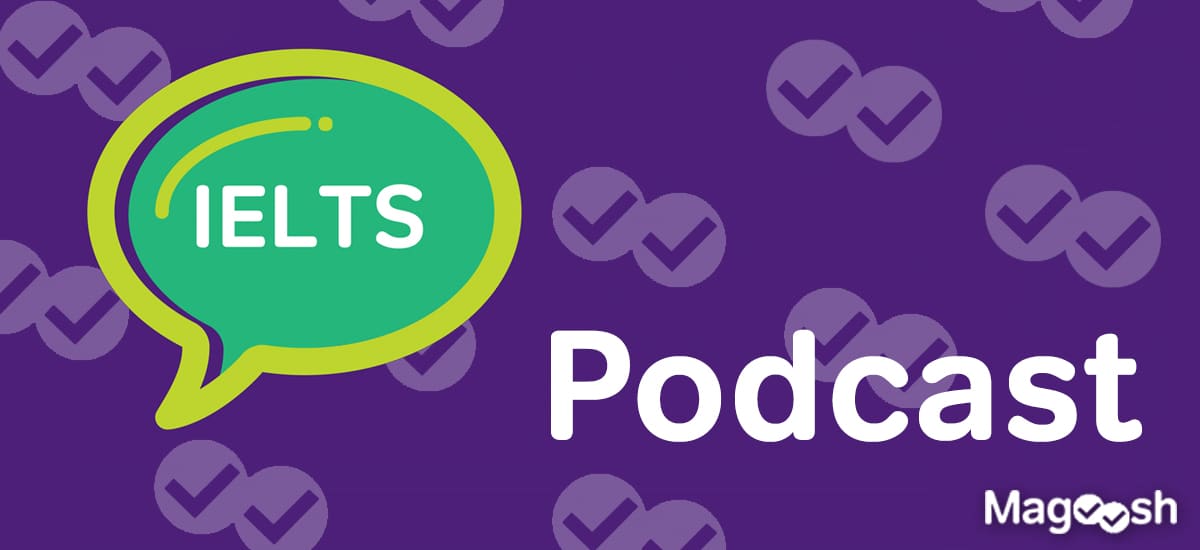
Vocabulary Lesson 1: Information
Listen and subscribe on iTunes or Stitcher. Or listen right here:
In this episode of the Magoosh IELTS podcast, your teacher Eliot Friesen explains how to use four words all related to giving and receiving information: Interpret, Assume, Perceive, and React.
You’ll see this vocabulary in the reading passages on your IELTS exam. These words will also be useful as you’re writing responses to your task one and task two questions.
If you like this lesson, please subscribe on iTunes or Stitcher for more IELTS Vocabulary lessons, and check out all of our IELTS Podcast episodes here!
Download the complete list of IELTS Vocabulary words.

IELTS Podcast – Episode 1 Transcript
(Translations: русский, 普通话, فارسی, Tiếng Việt, Português)
Welcome to the Magoosh IELTS Vocabulary Podcast. This is Lesson 1. In this episode, we will cover 4 words all related to information: Interpret, Assume, Perceive, and React
Don’t forget to check out our show notes for a link to your free IELTS vocabulary list containing these words and others, and visit IELTS.Magoosh.com for more great resources to improve your IELTS band score.
Let’s get started.
I’d like to introduce you to your teacher, Eliot. He is the Magoosh IELTS expert and, here’s a fun fact about Eliot: he does not like watermelon!
Eliot Intro
Hello Magoosh IELTS podcast listeners, welcome to today’s show. I’m Eliot, the IELTS expert from Magoosh, and it’s true, I’m not a picky eater, but I just don’t like watermelon. Today, we’re going to look at four words that are going to help you to understand the kind of language you’re going to see in the reading passages on your IELTS exam.
These words will also be useful as you’re writing responses to your task one and task two questions.
Make sure to go to the link in the show notes to get the full list of vocabulary words.
The theme for the words in today’s episode is information, and what we do with information when we think about things or when we interpret things.
Interpret
And in fact, interpret is the first word on the list. So let’s start with that one, okay?
Interpret, what does it mean?
Well, to interpret something means to make sense of something. To analyze something.
We could use it, for example, in a situation where you are trying to analyze something you’re reading or hearing in another language, a language that’s not your native language.
When you hear a word, and you are able to say it in your own language, maybe you’ll then try to explain it to a friend who doesn’t understand, you are interpreting what you hear.
But it doesn’t have to be another language, you could interpret something that’s already in your own language.
Often we use the word interpret for understanding something that’s complicated or difficult to understand, right?
So maybe you have a complicated contract you’re looking at, and maybe it’s so complicated, you need a lawyer, or somebody, to help you understand what’s there.
The lawyer is going to interpret it for you, to make sense of it, or analyze it for you.
That’s what interpret means.
Assume
The next word is assume.
To assume is to make a conclusion about something without having all of the facts or information.
We often use the word assume when we’ve discovered that we are actually thinking about the wrong thing, or we’ve made a mistake about something.
So for an example, maybe you thought a friend wasn’t coming to a party you were throwing.
But then, actually, she did arrive.
Okay so, you could say in that situation to your friend, “hey, I assumed you weren’t coming to my party, but I was so happy that you actually came.”
To assume something is to think a certain way about something, without having all the facts or information.
It does not necessarily mean you were wrong.
You can assume something and find out that you’re correct about it later. For example, maybe you assume your friend isn’t going to the party, and in fact she doesn’t go. This time her actions supported your assumption. (Assumption is the noun form of the verb “to assume” by the way. To assume is the verb.)
But, it’s to think something without having all of the facts or the information. Okay? So that’s assume.
Perceive
The next word on our list for today is to perceive.
To perceive something simply means to sense or to feel something without clear evidence.
We often use perceive when we’re taking in information that is not clear or not certain.
So for example, maybe a teacher can perceive that her students are tired or bored, right?
The students aren’t telling the teacher, hey teacher, I’m bored.
Instead the teacher is picking up clues from the student’s body language, or maybe the students are yawning—and in this way the teacher perceives that they are bored or tired.
When you perceive something, you’re taking in indirect information and trying to understand it.
So that’s perceive.
React
The final word today is to react.
To react is different than the words we’ve discussed so far because when you react to something, it’s a response.
When you react to something, it means that you respond in a particular way directly to that thing you just observed or noticed.
So for example, when we use the word react in athletics or sports, when somebody throws you the ball, you’re not going to just let it hit you, you’re going to react to it. You’re going to try to catch it.
So that’s react.
Outro
Great! In this episode you learned 4 words related to information. For more vocabulary, download the full list of vocabulary in the show notes and tune in to the next episode.
If you like our show, help us out by leaving a rating and review in iTunes and don’t forget to hit the subscribe button. Until next time! This is Naomi at Magoosh wishing you happy studying.

